- Home
- Gustave Aimard
Les fils de la tortue. English Page 3
Les fils de la tortue. English Read online
Page 3
CHAPTER III.
THE CONVENT OF THE PURISIMA CONCEPCION.
Whatever may be asserted to the contrary, a religion frequentlyundergoes, unconsciously, the atmospheric influences of the country inwhich it is professed; and while remaining the same fundamentally, theforms vary infinitely, and make it change its aspect according as itpenetrates into countries where climates are different.
This may at the first glance appear a paradox; and yet, if our readerswill take the trouble to reflect, we doubt not but they will recognisethe justice and truth of our assertion.
In some countries, like Germany and England, where thick fogs broodover the earth at certain periods of the year, the character of theinhabitants is tinged by the state of the gloomy nature that surroundsthem. Their ideas assume a morose and mystical hue perfectly in harmonywith what they see and feel. They are serious, sad, and severe,positive and material, because fog and cold remind them at everymoment that they must think of themselves, take care, and wrestle, soto speak, with the abrupt and implacable nature which allows them norespite. Hence come the egotism and personality, which destroy allthe poetry of religion which is so marvellously developed in southernnations.
If we look further back, we shall find the difference even moremarked. For this purpose it is only necessary to compare Greekmythology--Paganism, with its smiling images which deified vices andpassions, with the gloomy and terrible worship of Odin in Scandinavia,or with that even more sanguinary paid to the god Teutates in the Gaulof olden times, and in the sombre forests of Germany.
Can we deny the influence of the northern ice over the disciples ofOdin? Is not the savage majesty of the immense forests which shelteredthe priests of Teutates the principal cause of the mysteries which theycelebrated? And, lastly, is not the benignity of the Greek mythologyexplained by the beauty of the sky in which it sprang up, the mildnessof the climate, the freshness of the shadows, and the ever renewingcharm of its magnificent landscapes?
The Catholic religion, which substitutes itself for all the rest, hasbeen, and still is, subjected to the action of the temperature of thosecountries into which it has penetrated, and which it has fecundated.
In Chili it is, so to speak, entirely external. Its worship is composedof numerous festivals pompously celebrated in churches glittering withlight, gold, silver, and precious stones, of interminable processionsperformed under a reign of flowers, and clouds of incense which burnuninterruptedly.
In this country, beloved of the sun, religion is full of love; theardent hearts that populate it do not trouble themselves at all abouttheological discussions. They love God, the Virgin, and the saints withthe adoration, self-denial and impulse which they display in all theiractions.
Catholicism is changed with them, though they do not at all suspectit, into a sort of Paganism, which does not account for its existence,although that existence cannot be contested.
Thus they tacitly accord the same power to any saint as to deity; andwhen the majority of them address their prayer to the Virgin, they donot pray to Mary the Mother of our Saviour, but to Nuestra Senora delos Dolores, Nuestra Senora del Carmen, Nuestra Senora de Guadalupe,Nuestra Senora de la Soledad, Nuestra Senora del Pilar, Nuestra Senorade Guatananga, and ten thousand other Our ladies.
A Chilian woman will not hesitate to say, with perfect conviction, thatshe is devoted to Nuestra Senora de la Sierra, because she is far morepowerful than Nuestra Senora del Carmen, and so on with the rest.
We remember hearing one day in the church of Nuestra Senora de laMerced, at Pilar, a worthy hacendero praying to God the Father tointercede for him with Nuestra Senora del Pilar, so as to obtain forhim a good harvest!
Novenas are kept and masses ordered for the slightest pretext. If aChilian lady be deserted by her lover, quick a mass to bring him backto her side; if a man wish to avenge himself on one of his fellow men,quick a mass that his revenge may be carried out!
There is also another way of insuring the protection of any saint, andthat is by making a vow. A young man who wishes his beloved lady togive him a meeting, never fails to pledge himself by a vow addressed toSan Francisco or San Antonio to perform some pious deed, if the saintwill consent to advise the lady in his favour. And these practices mustnot be taken for juggling; the people who accomplish them do so inperfect good faith.
Such is the way in which the Catholic religion is understood in SouthAmerica.
In all the ex-Spanish colonies members of the clergy swarm, and we arenot afraid of being taxed with exaggeration when we assert that inChili they form at least one-fourth of the population. Now, the clergyare composed of an infinite number of monks and nuns of every possibleform, species, and colour, Franciscans, Benedictines, Genovevans,Barefooted Carmelites, Brothers of Mercy, Augustines, and many otherswhose names have escaped us. As will be easily understood, thesereligious communities, owing to their considerable number, are not paidby the government, whose resources would not nearly suffice for theirsupport. Hence they are compelled to create a thousand trades, eachmore ingenious than the other, in order to be able to exist.
In these countries--and there will be no difficulty in understandingthis--the clergy are excessively tolerant, for the very simple reasonthat they have need of everybody, and if they committed the mistake ofalienating the inhabitants they would die of hunger in a fortnight.It is worth while seeing in Chili the extension given to the trade inindulgences. _Agnus Deis_, scapularies, blessed crosses, and miraculousimages; everything has its price, everything is sold. So much for aprayer--so much for a confession--so much for a mass.
A Chilian sets out on a journey, and in order that no accident mayhappen to him on the road, he has a mass said. If, in spite of thisprecaution, he is plundered on the high road by the Salteadores, hedoes not fail on his return to go to the monk of whom he ordered themass, and bitterly complain of his want of efficacy. The monk isaccustomed to such recriminations, and knows what to answer.
"That does not surprise me, my son," the Franciscan, or theBenedictine, or whoever he may be, as the answer is always the same,replies; "what the deuce did you expect to have for a peso? Ah, if youhad been willing to pay a half ounce, we should have had the beadle,the cross, the banner, two choristers, and eight candles, and then mostassuredly nothing would have happened to you; but how could you expectthe Virgin to put herself out of the way for a peso?"
The Chilian withdraws, convinced that he is in the wrong, and promisingnot to be niggardly on the next opportunity.
With the exception of the minor trades to which we have alluded, themonks are jolly fellows, smoking, drinking, swearing, and making loveas well as a man of the world. It is not uncommon to see in a wineshop a fat monk with a red face and a cigarette in his mouth, merrilyplaying the vihuela as dance accompaniment to a loving couple whom hewill confess next morning. Most of the monks carry their knife in theirsleeve, and in a quarrel, which is a frequent thing in Chili, use it aswell, and with as little remorse as the first comer.
With them religion is a trade by which they make the largest profitpossible, and does not at all compel them to live without the pale ofthe common existence.
Let us add, too, in concluding this rather lengthy sketch, but whichit was necessary to give the reader, in order that by knowing Chilianmanners, he might be able to account for the strangest of the incidentswhich we are about to record, that, in spite of the reproaches whichthe light conduct of the monks at times deserves--regard being had tothe sanctity of the gown they wear--they are not the less an object ofrespect to all, who, taking compassion on human weakness, excuse theman in the priest, and repay tolerance for tolerance.
The convent of the Purisima Concepcion stands at the extremity ofthe Almendral. It is a vast edifice, entirely built of carved stone,nearly two hundred years old, and was founded by the Spaniards a shorttime after their arrival in Chili. The whole building is imposing andmajestic, like all the Spanish convents; it is almost a small town, forit contains everything which may be useful and
agreeable for life--achurch, a hospital, a washhouse, a large kitchen garden, a shady andwell-laid out park, reserved for the promenades of the nuns, and largecloisters lined with frescoes, representing scenes from the life of theVirgin, to whom the convent is consecrated. These cloisters, borderedby circular galleries, out of which, open the nuns' cells, enclose asandy courtyard, containing a piece of water and a fountain, whose jetrefreshes the air in the midday heat.
The cells are charming retreats, in which nothing that promotescomfort is wanting--a bed, two chairs covered with Cordovan leather,a prie-Dieu, a small toilet table, in the drawer of which you may becertain of finding a looking glass, and a few sacred pictures, occupythe principal space destined for necessary articles. In one corner ofthe room is visible, between a guitar and a scourge, a statue of theVirgin, with a wreath of roses on her head and a constantly-burninglamp before her. Such is the furniture which will be found, with butfew exceptions, in the cells of the nuns.
The convent of the Concepcion contains about one hundred and fifty nunsof the order of Mount Carmel, and some sixty novices. In this countryof toleration, strict nunneries are rare; the sisters are allowed togo into town and pay or receive visits; the rule is extremely gentle,and with the exception of the offices which they are expected to attendwith great punctuality, the nuns, when they have once entered theircells, are almost free to do what they think proper, no one apparentlypaying any attention to them.
After the incident which we recorded in our first chapter, theprocession, momentarily interrupted by the furious attack of Leon'shorses, was reorganized as well as it could be; all the personscomprising it returned to their places so soon as the first alarm wasover, and two hours after the gates of the Purisima Concepcion closedagain upon the long file of nuns engulfed in its walls.
So soon as the crosses, banners, and statues of saints had beendeposited with all proper ceremony in their usual places, after a shortprayer repeated in community, the ranks were broken, and the nuns beganchattering about the strange event which had suddenly interrupted themas they left the cathedral. Several of them were not tired of praisingthe bold rider who had so cleverly guided his runaway horse, and saveda great misfortune by the skill which he had displayed under thecircumstances.
From the midst of a group of about a dozen sisters conversing together,there came forth two maidens, dressed in the white garb of novices,who, taking each other's arm, walked gently toward the most desertedpart of the garden. They must have eagerly desired not to be disturbedin their private conversation, for, selecting the most shaded walk,they took great care to hide themselves from their companions'observation behind the shrubs that formed the borders.
They soon reached a marble seat hidden behind a clump of trees, infront of a basin filled with transparent water, whose completelymotionless surface was as smooth as that of a mirror. No better placecould have been selected for a confidential conversation; so they satdown, and raised the veil that covered their face.
They were two charming girls, who did not count thirty years betweenthem, and whose delicate profile was gracefully designed under theirpure and exquisitely white wimple. The first was Dona Maria de Souza ySoto-Mayor; the other was Dona Rosita Sallazar, sister of the dashingDon Pedro, of whom we have already got a glimpse as affianced husbandof Inez.
Dona Maria's face displayed visible traces of emotion. Was it theresult of the terror she had felt on seeing herself almost trampledon by the smuggler's horse, or did a cause, of which we are ignorant,produce the effect which we have just indicated?
The conversation of the young ladies will tell us.
"Well, sister," Rosita asked, "have you recovered from the terror whichthis morning's event caused you?"
Dona Maria, who seemed absorbed in secret thoughts, started, andhurriedly answered--
"Oh! I am well now; quite well, thank you."
"In what a way you say that, Maria! What is the matter? You are quitepale."
A short silence followed this appeal. The young ladies took eachother's hand, and waited to see which would be the first to speak.
Maria and Rosita, who were nearly of the same age, loved each otherlike sisters. Both novices, and destined to take the veil at the samedate, the identity of their position had produced between them anaffectionate sympathy which never failed them. They placed in a commonstock, with the simple confidence of youth, their hopes and sorrows,their plans and dreams--brilliant winged dreams, which the conventwalls would pitilessly break. They had no secret from each other, andhence Rosita was grieved by the accent with which Maria had answeredher when she asked her how she was. The latter evidently concealedsomething from her for the first time since she had entered the convent.
"Maria," she said to her, gently, "forgive me if I acted indiscreetlyin asking after your dear health; but I feared, on noticing the pallorof your face--"
"Dear Rosita, how kind you are!" Maria interrupted, embracing hercompanion tenderly; "and how wrong I am! Yes, I am suffering, really;but I know not from what, and it only began just now."
"Oh! accursed be the wicked man, cause of so much terror!" Rositacontinued, alluding to Leon the smuggler.
"Oh, silence, Rosita! Speak not so of that cavalier, for he has on hisface such a noble expression of courage and goodness that--"
"So you looked at him, sister?" Rosita exclaimed.
"Yes, when I regained my senses and opened my eyes, his were fixed onme."
"What! he dared to raise your veil? But it is a great sin to let a mansee your face, and you must confess it to dear Mother Superior; theconvent rule demands it."
"I know it, and will conform."
"After all," Rosita continued, with volubility, "as you had fainted,you could not prevent him raising your veil; hence it is not yourfault, but that young man's."
"He saved my life!" Maria murmured.
"That is true, and you are bound to feel grateful to him instead ofhating him."
"Do you think I can remember him without sinning?"
"Certainly: is it not natural to remember those who have done us agreat service?"
"Yes, yes; you are right," Maria exclaimed, joyfully. "Thanks,sister--thanks, sister: your words do me good, for I was afraid itwould be wrong to think of him who saved me."
"On the contrary, sister," Rosita said, with a little doctorial tonewhich rendered her ravishing, "you know that Mother Abbess dailyrepeats to us that ingratitude is one of the most odious vices."
"Oh, in that case, I did right in giving him my scapulary as a pledgeof remembrance."
"What! did you give him that holy object?"
"Oh, poor young man! he seemed so affected, his glance was so full ofsorrow and grief--"
While Maria was speaking, Rosita was examining her, and after the lastwords, entertained no doubt as to the feelings which animated herfriend.
"Maria," she said to her, bending down to her ear and speaking so lowthat no other but the one for whom it was meant could hear it--"Maria,you love him, do you not?"
"Alas!" Maria exclaimed, all trembling--"do I know? Oh, silence, formercy's sake!" she continued, impetuously. "I love him! But who wouldhave taught me to love? A poor creature, hurled within the walls ofthis convent at the tenderest age, I have up to this day known noughtbut the slavery in which my entire life must be spent. Excepting you,my kind Rosita, is there a creature in the world that takes an interestin my fate, is happy at my smile or grieved at my tears? Have I everknown since the day when reason began to enlighten my heart, theineffable sweetness of maternal caresses--those caresses which aresaid to warm the heart, make the sky look blue, the water more limpid,and the sun more brilliant? No; I have ever been alone. My mother, whomI could have loved so dearly--my sister, whom I sought without knowingher, and whose kisses my childish lips yearned for--both shun me andabandon me. I am in their way; they are anxious to get rid of me; andas all the world repulses me, I am given to God!"
A torrent of tears prevented the young lady from continuing. Rositawas
terrified by this so true grief, and tried to restore her friend'scalmness, while unable to check the tears that stood in her own eyes.
"Maria! why speak thus? it is an offence to God to complain so bitterlyof the destiny which He has imposed on us."
"It is because I am suffering extraordinary torture! I know not what Ifeel, but I fancy that during the last hour the bandage which coveredmy eyes has suddenly fallen, and allowed them to catch a glimpse ofan unknown light. Up to this day I have lived as the birds of the airlive, without care for the morrow and remembrance of yesterday; and inmy ignorance of the things which are accomplished outside these wallsI could not regret them. I was told: You will be a nun; and I accepted,thinking that it would be easy for me to find happiness wherever mylife passed gently and calmly; but now it is no longer possible."
And the maiden's eyes flashed with such a brilliancy that Rosita darednot interrupt her, and listened, checking with difficulty the beatingof her own heart.
"Listen, sister!" Maria continued, "I hear an undefinable music in myears; it is the intoxicating promises which the joys of the world wakein me, which I am forbidden to know, and which my soul has divined.Look! for I saw strange visions pass before my dazzled eyes. They arelaughing pictures of an existence of pleasures and joys which flashand revolve around me in an infernal whirlwind. Take care; for I feelwithin me sensations which horrify me; shudders that traverse my wholebeing and cause me impossible suffering and pleasure. Oh, when thatyoung man's hand touched mine this morning, I trembled as if I hadseized a red-hot iron; when I regained my senses, and felt his breathon my face, I fancied that life was going to abandon me; and when Iwas obliged to leave him, it seemed to me as if there were an utterdarkness around me; I saw nothing more, and was annihilated. His fieryglance cast eternal trouble and desolation into my soul. Yes, I lovehim: if loving be suffering, I love him! For, on hearing the conventgates close after the procession, a terrible agony contracted my heart,an icy coldness seized upon me, and I felt as if the cold tombstonewere falling again on my head."
Overcome by the extreme emotion which held possession of her, themaiden had risen; her face was flushed with a feverish tinge; her eyesflashed fire; her voice had assumed a strange accent of terror andpassion; her bosom heaved wildly, and she appeared to be transfigured!Suddenly she burst into sobs, and hiding her face in her hands, yieldedto her despair.
"Poor Maria!" said Rosita, affected by this so simply poignantdesolation, and seeking in vain by her caresses to restore calmness,"how she suffers!"
For a long time the two maidens remained seated at the same spot,mingling their tears and sighs. Still a complete prostration eventuallysucceeded the frenzy which had seized on Maria; and she was preparing,on her companion's entreaties, to return to her cell, when severalvoices, repeating her name, were heard at a short distance from thethicket where she had sought refuge.
"They are seeking us, I think," said Rosita.
"They are calling me," Maria continued; "what can they want with me?"
"Well, beloved sister, we will go and learn."
The two maidens rose, and soon found themselves in the presence of twoor three sisters, who were looking for them.
"Ah, there you are!" the latter exclaimed; "Holy Mother Superior isasking after you, Maria; and we have been seeking you for the last tenminutes."
"Thanks, sisters," Maria answered; "I will obey the summons of our goodmother."
"Be calm," Rosita whispered to her, with some amount of anxiety.
"Fear nothing; I will manage to hide my feelings." And all returned inthe direction of the convent.

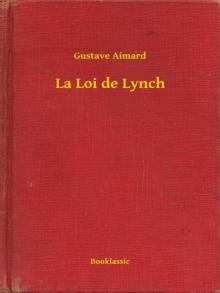 La loi de lynch. English
La loi de lynch. English The Guide of the Desert
The Guide of the Desert The Trail-Hunter: A Tale of the Far West
The Trail-Hunter: A Tale of the Far West The Pirates of the Prairies: Adventures in the American Desert
The Pirates of the Prairies: Adventures in the American Desert The Treasure of Pearls: A Romance of Adventures in California
The Treasure of Pearls: A Romance of Adventures in California Les outlaws du Missouri. English
Les outlaws du Missouri. English Les trappeurs de l'Arkansas. English
Les trappeurs de l'Arkansas. English The Border Rifles: A Tale of the Texan War
The Border Rifles: A Tale of the Texan War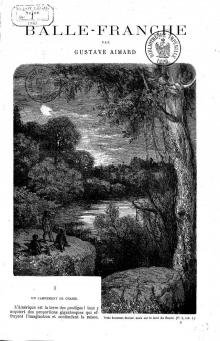 Balle-Franche. English
Balle-Franche. English The Queen of the Savannah: A Story of the Mexican War
The Queen of the Savannah: A Story of the Mexican War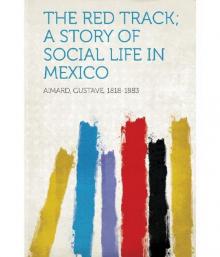 The Red Track: A Story of Social Life in Mexico
The Red Track: A Story of Social Life in Mexico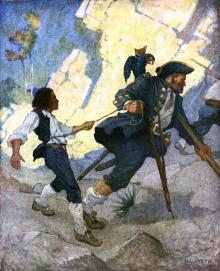 La fièvre d'or. English
La fièvre d'or. English The Pearl of the Andes: A Tale of Love and Adventure
The Pearl of the Andes: A Tale of Love and Adventure Les fils de la tortue. English
Les fils de la tortue. English The Indian Chief: The Story of a Revolution
The Indian Chief: The Story of a Revolution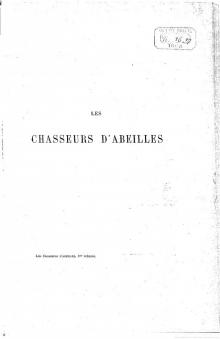 Les chasseurs d'abeilles. English
Les chasseurs d'abeilles. English The Adventurers
The Adventurers